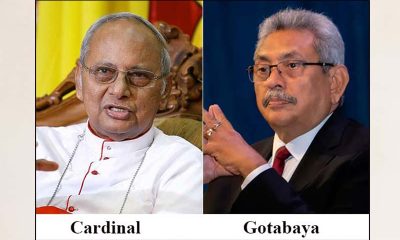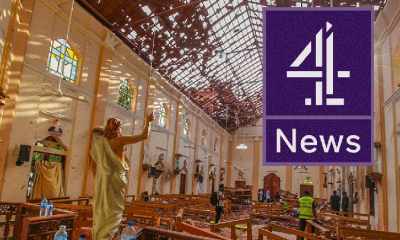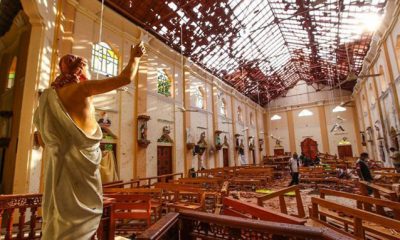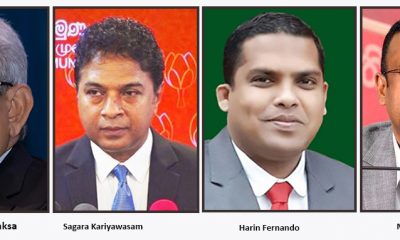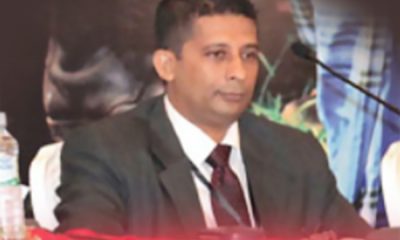Editorial
Channel 4 – Why now? Why not?

The latest Channel 4 documentary on Sri Lanka’s Easter Sunday bombings is claimed to be an exposure, but while there’s nothing dramatically new in it, it seems to have is set the cat among certain pigeons. Allegations that the military intelligence was involved with Islamic extremists involved in the Easter Sunday carnage is not new. In fact, three investigations have already linked the Directorate of Military Intelligence (DMI) and the State Intelligence Service (SIS) to the bombers.
What the new allegations in the Channel 4 documentary against the current SIS chief and former DMI officer, retired Major General Suresh Sallay, are aimed at is connecting the dots to the Rajapaksa family, and Gotabaya Rajapaksa, in particular. The video suggests there was a conspiracy to bring the Rajapaksas back to power in 2019. The bombing certainly helped Gotabaya to clinch the presidential candidacy at a time when the country clamoured for a strong leader who could fight terrorism. Within two days of the April 21, 2019 bombing, Gotabaya came out declaring that he was the national security candidate who could wipe out Islamic extremists.
It should be clear even to those not familiar with local political chicanery that Gotabaya Rajapaksa benefited from the attack, but there is no proving beyond reasonable doubt that he organized the carnage. So what is the new Channel 4 video about? On the face of it, it is an attempt by the British public broadcaster (Channel 4 is a British government-owned network) to find the “truth” behind the Easter attacks, a campaign spearheaded by Cardinal Malcolm Ranjith and the Catholic Church. The Vatican too had weighed in with the Pope himself urging Sri Lankan leaders to establish who was behind the most audacious terror attack even for a country used to decades of senseless violence.
The SLPP has been quick to dismiss the documentary arguing that their party was on the ascendancy after the February 2018 local elections when they won a landslide and was anyway on the road to building on that success at the November 2019 presidential polls.
The SLPP stalwarts may have forgotten how unpopular they had become with their 52-day “coup” with the backing of President Maithripala Sirisena. The then Prime Minister Ranil Wickremesinghe saw a surge in the support for him during the illegal power grab orchestrated by Sirisena and Mahinda Rajapaksa.
Insiders know that Gotabaya Rajapaksa was taken by surprise when he heard from a friend that elder brother Mahinda had been sworn in as prime minister. His prospects dimmed when public opinion turned against the SLPP with the power grab. Then comes the Easter bombings. There is no denying that Rajapaksa won, thanks to the public anger over the failure of the Wickremesinghe-Sirisena government to prevent the carnage. People were angry that intelligence warnings issued by an agency in neighbouring India had been ignored. Sri Lanka’s own DMI and SIS were oblivious to what was going to happen.
A vocal campaigner who had previously pointed fingers at the state intelligence apparatus, Manusha Nanayakkara, agrees that the allegations should be investigated afresh, but casts aspersions on Channel 4 intentions. He and other worthies of the SLPP have said that the video was timed for the UN Human Rights Council sessions opening tomorrow (Sept 11) in Geneva.
The British broadcaster had initially announced their documentary was going to be aired on August 15. Then it was pushed back by another week. Finally, it was released on Tuesday British time (Wednesday early morning Sri Lanka time) after Sri Lankan authorities raised issues that had to be legally resolved. The UNHRC has three regular sessions a year — February-March, June-July and September-October. Therefore, to argue that this release is to coincide with a UNHRC session is a stretch.
Gotabaya Rajapaksa has responded to the documentary and denied that he influenced Suresh Sallay or had any dealings with the intelligence operative while he was out of power between 2015 and 2019 and had nothing to do with the intelligence and security apparatus. Looks like Gotabaya has also forgotten about the 52-day government his brother led and that he still had loyalists in the security establishment. In fact, Gotabaya admits in his statement that he promoted Sallay as the head of the SIS, no sooner he became president.
More strangely, Gotabaya remains silent on an equally devastating allegation that he wanted the editor of the Sunday Leader Lasantha Wickrematunge killed. The “insider” quoted in the Channel 4 video, whistleblower Azad Maulana, claims Gotabaya wanted Lasantha killed ASAP (As Soon As Possible). Maulana was the spokesman of the then Eastern province chief minister and current SLPP MP, Sivanesathurai Chandrakanthan, alias Pillayan. There are allegations that Pillayan was involved with the formation of the infamous “Tripoli” unit of the DMI which is accused of killing Lasantha and attacking several others when Gotabaya was the defence secretary under his brother Mahinda’s presidency.
Thus, the Channel 4 video does not offer any answers, but only raises more questions. As with the three previous investigations, the sum total of the documentary is the need for not only criminal investigation but a broader intelligence probe. MPs from both sides of the House have called for the suspension of SIS chief Suresh Sallay, who is implicated in the documentary. He has denied meeting the Easter Sunday bombers and argued that he was out of the country at the time. However, one of his former bosses, Field Marshal Sarath Fonseka has already cast doubt over those claims saying Sallay, like many other intelligence operatives, would have travelled under several passports.
As Cardinal Ranjith himself articulated on Wednesday, whatever the perceived bias is of Channel 4, it is time for an independent, transparent, internationally acceptable investigation into all aspects of the carnage. The government owes it to its people, not least the victims and survivors of the attacks, because it is the right thing to do.
Editorial
Ensure safety of COPF Chairman

Saturday 8th June, 2024
It was with shock and dismay that we received the news about death threats to COPF (Committee on Public Finance) Chairman Dr. Harsha de Silva over the ongoing parliamentary probe into the on-arrival visa scam. Dr. de Silva yesterday told Speaker Mahinda Yapa Abeywardena, in Parliament, that he was facing death threats and intimidation, and it was incumbent upon Parliament to ensure his safety. He stopped short of naming names, but revealed that some ruling party MPs were among those who had ganged up against him. The Speaker only said there had been no complaint, and he would look into the matter.
The SLPP-UNP government has been doing everything in its power to have all parliamentary committees under its thumb. The COPE (Committee on Public Enterprises), which once helped restore public faith in the legislature by exposing state sector corruption, has now become a mere appendage of the incumbent regime, thanks to the appointment of SLPP MP Rohitha Abeygunawardena as its Chairman. The SLPP-UNP combine also tried to oust COPF Chairman Dr. de Silva, but in vain. However, it knows more than one way to shoe a horse.
The COPF, under Dr. de Silva’s chairmanship, has been a thorn in the side of the government, which is struggling to cover up numerous corrupt deals. Dr. de Silva yesterday told Parliament that he found it extremely difficult to function as the COPF head due to severe resource constraints his committee was facing; he himself had to pay the salaries of some of his staff members besides burning the midnight oil.
The sheer workload he had to cope with as the COPF chief had taken its toll on his health, he said, informing the Speaker that he was at the end of his tether, and at times thought of resigning from the COPF. This is exactly what the government wants him to do; resource squeezes and threats are aimed at making him quit.
On 26 May, Dr. de Silva revealed, in an ‘X’ post, that the COPF had uncovered some vital information about the visa scam and it would reveal everything after its final meeting on the issue; the COPF was committed to exposing the truth behind the controversial tender, he added. In an editorial comment on 27 May, we warned him.
While thanking him for his bold stand, we pointed out that by making such a statement, he had thrown caution to the wind, and become a marked target, with the government making an all-out effort to delay the COPF investigation lest the truth should come out much to the detriment of its interests in this election year. Unfortunately, what was feared has come about; Dr. de Silva is complaining of death threats and government moves to strangulate the COPF financially to derail its investigations.
Dr. de Silva’s predicament exemplifies the fate that befalls the few good men and women in Parliament. It is hoped that all those who seek an end to the state sector corruption will rally behind Dr. de Silva, and bring pressure to bear on the government to ensure his safety. Let Dr. de Silva be urged to reveal the names of those who have issued threats, veiled or otherwise, to him and are trying to scuttle the COPF probes.
Editorial
Dead man walking!

Friday 7th June, 2024
The SLPP-UNP government is going hell for leather to make bad laws as if there were no tomorrow. It is abusing its parliamentary majority, which has been retained with the help of some crossovers, for that purpose. The Opposition, the media and trade unions are up in arms, and understandably so. The incumbent regime is a dead man walking; it is so desperate that it is capable of anything. Hence the need for it to be restrained.
The Electricity (Amendment) Bill (EAB) plunged Parliament into turmoil yesterday, but the government secured its passage. The Supreme Court (SC) determined the entire EAB inconsistent with the Constitution and recommended changes thereto. After unveiling the Bill, sometime ago, Minister of Power and Energy Kanchana Wijesekera hailed it as an excellent piece of legislation aimed at straightening up the power sector to serve the public interest better.
The SC determination left him with egg on his face. He reminded us of the proverbial curate who, while eating a stale egg, assured his host, a Bishop, that parts of it were excellent. Wijesekera’s egg, as it were, made Parliament stink yesterday, but he sought to please his masters by praising it as a silver bullet.
EAB should have been discarded and a new one drafted in consultation with all stakeholders. But the government is apparently driven by an ulterior motive; its aim is not to serve Sri Lanka’s interests but to look after those of some moneybags.
It is not uncommon for Bills to contain some flaws, which are rectified either before or during the committee stage. But there is something terribly wrong with draft Bills that are full of sections inconsistent with the Constitution. The drafters of EAB have demonstrated their sheer ignorance of the supreme law, and that they are not equal to the task of drafting Bills. If they had read the Constitution at least perfunctorily, they would not have drafted such a bad law.
Ignorant and incompetent, they do not deserve to be paid with public funds and must be sent back to law school. They must be summoned before Parliament and questioned on their serious lapses, which have caused public faith in the national legislature to diminish.
Curiously, the MPs who demand that judges, doctors, Central Bankers, and other public officials be summoned before Parliament have taken badly drafted Bills for granted. The power sector trade unions yesterday alleged that EAB was of Indian origin and geared towards furthering the interests of Adani Group at the expense of Sri Lanka.
Most critics of EAB are agreeable in principle to the need for power sector reforms; the Ceylon Electricity Board should be given a radical shake-up, and transformed into a modern organisation capable of providing a better service at a lower cost. They only asked the government to tread cautiously, consulting all stakeholders and taking action to ensure that the country’s interests prevailed over everything else. But the government was in a mighty hurry to steamroller the Bill through Parliament, making the Opposition ask whether it was doing so at the behest of some external forces involved in controversial power generation deals here.
What is passed by the current Parliament can be either amended or abolished by a future parliament in a constitutionally prescribed manner. But that does not mean that a government is free to pass bad laws, making the country enter into long-term agreements with powerful nations and their investors. It looks as if the SLPP-UNP regime did not care two hoots about the consequences of its actions.
Editorial
Modi Magic on the wane

Thursday 6th June, 2024
The outcome of India’s parliamentary election (2024) has led to a ‘perspective ambiguity’. Prime Minister Narendra Modi lost no time in declaring victory for the BJP-led NDA alliance, which secured 293 seats in the 543-member Parliament, but he must be a worried man. The BJP is short of 32 seats to form a government under its own steam; it has lost 63 seats or about 20% of its parliamentary strength. It had 303 seats in the previous Parliament, and that number has dropped to 240.
Modi has become the second Indian Prime Minister to win a third term. The first PM to do so was Jawaharlal Nehru. But Nehru won an outright majority in Parliament in 1962; Modi has had to depend on smaller parties in his alliance to retain his hold on power. Modi must be reeling from a sharp drop in his victory margin in his own constituency, Varanasi; it has decreased to 152,000 from 480,000 in 2019 whereas Modi’s bete noire, Rahul Gandhi, won Raebareli by a staggering 390,000 votes.
Modi, who reigned supreme with 303 seats in the previous Parliament, is now dependent on parties such as Nitish Kumar’s JD-U and Chandrababu Naidu’s TDP to form a government. He has had to lead an alliance of strange bedfellows. Both Kumar and Naidu were bitter critics of Modi. Kumar helped form the oppositional alliance, the INDIA bloc, before switching his allegiance to PM Modi. Naidu also closed ranks with the BJP in the run-up to the election. These politicians have been described as extremely ambitious and highly unpredictable, and whether Modi will be able to manage them and consolidate his grip on the NDA alliance remains to be seen. They will demand plum ministerial posts in return for their support. The TDP is said to be eyeing Transport and Health portfolios! That is the name of the game in coalition politics, where it is not uncommon for the tail to wag the dog, so to speak. These two political leaders are however not the only problem Modi will have to contend with. The next five years will feel like an eternity for PM Modi.
Nothing would have been more shocking for the BJP than its defeat in Uttar Pradesh’s Faizabad constituency, where the Ram Mandir has been built. Modi may have thought he would be able to win the Lok Sabha election hands down after the consecration of that temple, which became a centrepiece of the BJP’s election campaign. The BJP lost that seat to the Samajwadi Party! Modi must be disappointed that the Ram Mandir hype failed to trigger a massive wave of support for his party. This particular defeat signifies a massive setback for the BJP’s ethno-religious agenda.
Modi’s divisive election campaign failed to yield the desired result. The BJP’s failure to secure an outright majority could be attributed to a host of factors, some of them being the suppression of the Opposition, the arrogance of power, chronic unemployment, and the rising cost of living. The BJP also did not care to reimage itself in a positive light to attract the youth.
Modi will hereafter see the Congress-led INDIA bloc with 223 seats, in his rearview mirror. The Congress (99 seats) and its allies have eaten into the BJP support base considerably, but they have a long way to go before being able to capture power.
The bumpy ride ahead for the BJP-led coalition government to be formed may improve the INDIA bloc’s chances of bettering their electoral performance and turning the tables on the BJP and its allies in time to come. Modi will have a lot to worry about in his third term.


